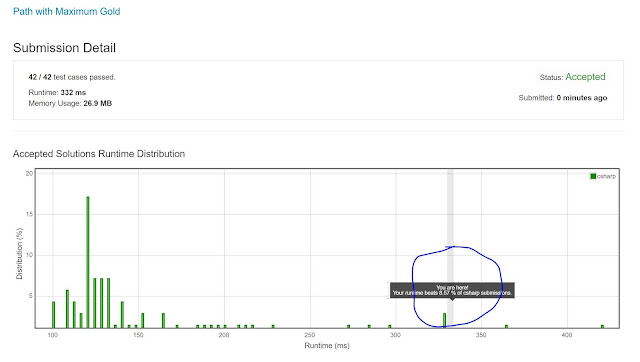Path with Maximum Gold - Medium, DFS
Problem is here: https://leetcode.com/problems/path-with-maximum-gold/
public class Solution
{
public int GetMaximumGold(int[][] grid)
{
int bestSum = 0;
for (int r = 0; r < grid.GetLength(0); r++)
{
for (int c = 0; c < grid[0].GetLength(0); c++)
{
if (grid[r][c] != 0)
{
Hashtable positionVisited = new Hashtable();
positionVisited.Add(r * 100 + c, true);
GetMaximumGoldFromPosition(grid, r, c, grid[r][c], ref bestSum, positionVisited);
}
}
}
return bestSum;
}
private void GetMaximumGoldFromPosition(int[][] grid,
int row,
int col,
int currentSum,
ref int overallSum,
Hashtable positionVisited)
{
overallSum = Math.Max(currentSum, overallSum);
int[] deltaRow = { -1, 1, 0, 0 };
int[] deltaCol = { 0, 0, -1, 1 };
for (int i = 0; i < deltaRow.Length; i++)
{
int newRow = row + deltaRow[i];
int newCol = col + deltaCol[i];
int key = newRow * 100 + newCol;
if (newRow >= 0 &&
newRow < grid.GetLength(0) &&
newCol >= 0 &&
newCol < grid[0].GetLength(0) &&
grid[newRow][newCol] != 0 &&
!positionVisited.ContainsKey(key))
{
positionVisited.Add(key, true);
GetMaximumGoldFromPosition(grid, newRow, newCol, currentSum + grid[newRow][newCol], ref overallSum, positionVisited);
positionVisited.Remove(key);
}
}
}
}
In a gold mine
grid of size m * n, each cell in this mine has an integer representing the amount of gold in that cell, 0 if it is empty.
Return the maximum amount of gold you can collect under the conditions:
- Every time you are located in a cell you will collect all the gold in that cell.
- From your position you can walk one step to the left, right, up or down.
- You can't visit the same cell more than once.
- Never visit a cell with
0gold. - You can start and stop collecting gold from any position in the grid that has some gold.
Example 1:
Input: grid = [[0,6,0],[5,8,7],[0,9,0]] Output: 24 Explanation: [[0,6,0], [5,8,7], [0,9,0]] Path to get the maximum gold, 9 -> 8 -> 7.
Example 2:
Input: grid = [[1,0,7],[2,0,6],[3,4,5],[0,3,0],[9,0,20]] Output: 28 Explanation: [[1,0,7], [2,0,6], [3,4,5], [0,3,0], [9,0,20]] Path to get the maximum gold, 1 -> 2 -> 3 -> 4 -> 5 -> 6 -> 7.
Constraints:
1 <= grid.length, grid[i].length <= 150 <= grid[i][j] <= 100- There are at most 25 cells containing gold.
public class Solution
{
public int GetMaximumGold(int[][] grid)
{
int bestSum = 0;
for (int r = 0; r < grid.GetLength(0); r++)
{
for (int c = 0; c < grid[0].GetLength(0); c++)
{
if (grid[r][c] != 0)
{
Hashtable positionVisited = new Hashtable();
positionVisited.Add(r * 100 + c, true);
GetMaximumGoldFromPosition(grid, r, c, grid[r][c], ref bestSum, positionVisited);
}
}
}
return bestSum;
}
private void GetMaximumGoldFromPosition(int[][] grid,
int row,
int col,
int currentSum,
ref int overallSum,
Hashtable positionVisited)
{
overallSum = Math.Max(currentSum, overallSum);
int[] deltaRow = { -1, 1, 0, 0 };
int[] deltaCol = { 0, 0, -1, 1 };
for (int i = 0; i < deltaRow.Length; i++)
{
int newRow = row + deltaRow[i];
int newCol = col + deltaCol[i];
int key = newRow * 100 + newCol;
if (newRow >= 0 &&
newRow < grid.GetLength(0) &&
newCol >= 0 &&
newCol < grid[0].GetLength(0) &&
grid[newRow][newCol] != 0 &&
!positionVisited.ContainsKey(key))
{
positionVisited.Add(key, true);
GetMaximumGoldFromPosition(grid, newRow, newCol, currentSum + grid[newRow][newCol], ref overallSum, positionVisited);
positionVisited.Remove(key);
}
}
}
}




Hey, Thanks for this algorithm, it works.
ReplyDeleteBut can you please give brief explanation on how the algorithm works, it looks more like magic to me, especially the GetMaximumGoldFromPosition() function.
Thanks